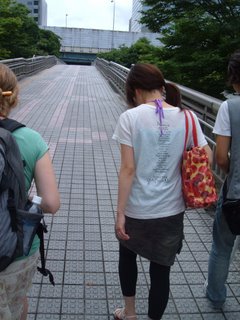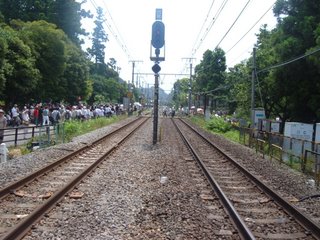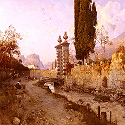What I've been up to the last week
You would think that for most normal people, moving into an apartment isn't a process that takes two weeks to finish. This is probably true. Fortunately, I am not a normal person.
Week 1, which started about two days after I returned to the States, was Books and Furniture Week. We bought or brought down the bed, desk, bookshelves, and... books, the latter pretty much weighing the same as the first three combined. Because I just had my one car most of the week, I could only take one or two crates up at a time, spend the night, and drive down the next day. You may begin to see why this took so darn long, and, my laptop staying at home, why I posted so rarely.
Week 2, which started after I came back from Hilton Head (which was great, thanks for asking), was Everything Else week. Up with my campus map, my Texas Hold'Em clock and my framed album of Alice's Restaurant. Up with my ABA-style basketball, my Akihabara towel and my Super Nintendo. Like in Week 1, I still usually only had one car; unlike Week 1, the stuff I was bringing up didn't stack in crates very well. Once I got here, I also had to help with the cable and other utility issues; the long and short of it is that, this very instant, I'm about 95% unpacked. I suppose I'll finish at 11:30 PM before the first day of school. That's Wednesday, by the way.
I like our apartment, though. It's in a rural part of town, yet convenient to the bus lines, near a park, and technically within walking distance to both Carrboro and Chapel Hill. The emphasis is on 'technically', though, at least for Chapel Hill. This is a 20-minute walk; the first 5 minutes and the last ten are fantastic, I love it. The middle 5... are a walk up a hill that seems like it stumbled in from San Francisco and decided to stop for a bit. It left its sidewalks somewhere in Oklahoma, too. Google Earth says it's only 80 feet tall, but Sam and I both think that has to be a lie. I've taken to poring over the bus schedule devotedly in my spare time.
When I'm not cursing William Richardson Davie for deciding to locate his blasted university here, these walks are a pretty good time to think about the most arcane of subjects. Example: criticism of Wikipedia. As y'all know, Wikipedia is the free, online, user-edited encyclopedia that I link to constantly on here as a quick source for more information. Some of you may also know that Wikipedia has been treated by the mass media as anything from a decent website to the "Khmer Rouge in diapers". Harsh Wikipedia criticism is hard to find online--we look out for our own, you know--but the following quote, from the source that got me thinking about this in the first place, sums up the general tone you'll find:
An interactive medium would be less likely to be like this, but it's not mutually exclusive. Wikipedia is horribly unreliable and subject to writer bias on non-scientific matters, but the presentation makes it very appealing to absorb its information and misinformation into your own life.The problem with these criticisms is that they tend to use the following reasoning: "Wikipedia is unreliable, so don't use it". Using this same kind of thinking, let's make a quick analogy of another example. Say that I think that Social Security is a good idea--giving money to old people helps support home-shopping networks, an industry which America has a distinct advantage in, helping bolster our economic primacy, yadda yadda yadda. Say, though, that I don't like the way it's been run under the Bush Administration. Naturally, my solution would be to dismantle Social Security altogether, leaving no part of it standing. Right?
That's what the critics of Wikipedia propose: get rid of the concept because you don't like its implementation. There are basically three possible scenarios here, illustrated by this analogy:
1) The critics of Wikipedia don't like the concept of Wikipedia.
2) The critics of Wikipedia don't think that its implementation can be salvaged.
3) The critics of Wikipedia are wrong.
1), I would hope, is untrue: if you don't agree that the rapid spread of knowledge and meaningful information is a good thing, you should also be out there picketing the Encyclopedia Brittanica. Though people like this exist, you normally don't see them writing magazine editorials.
2), I have found, is generally untrue. Some critics seem to think this, but because next to nobody who criticizes Wikipedia actually discusses *why* it can't be fixed, the point stands.
That leaves us with 3. Wasn't that easy?
Seriously, though, the point of Wikipedia is to collect information from all people qualified to give it. If you see an entry with an incorrect statement, don't whine about it--go out and fix it! If you go to the entry on Pope Benedict and see a picture of Emperor Palpatine, revert the page to what it looked like before that prankster came along. (This is an example, by the way, of why vandalism isn't the problem so many critics say it is. Generally, the more visible an act of vandalism is, the more likely it is to be made. How many people get their jollies by, say, changing the atomic weight of cadmium?) If you see a value judgment that you feel doesn't express an objective point of view, explain why on the talk pages. Bring a moderator in if you really care that much about it.
Will there always be problems with sensitive political issues, up-to-the-minute event updates, and the abundance of pop culture? Probably so, but these aren't the sorts of things you're going to find covered in a 'regular' encyclopedia anyway. If the people who disliked Wikipedia so darn much took the time they spent writing invective and used it to actually, you know, use and edit the encyclopedia like you're supposed to, there might not be much of a problem after all.
Now, my posting schedule. Since any attempts to say "I will post by such-and-such day" have clearly fallen flat on their collective face, I'm just going to say I'm hoping to update two to three times a week and be done with it. Once I get into my school routine, I'll try and bump that up some. But not until then. (And yes, my final Japan entry *is* forthcoming--just expect it to be about as good as my sestina.)












